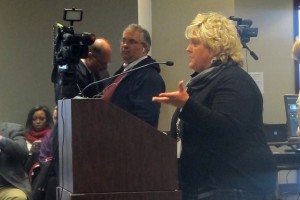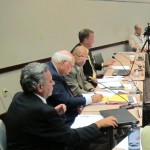Let It Snow Or Let It Go? State Board Talks eLearning Option
On an agenda packed with policy recommendations and legislative agenda discussions, the item that got the most attention at Wednesday’s State Board of Education meeting focused on eLearning.
The conversation started last month, when district officials in the Twin Lakes School Corporation announced on Facebook that the Indiana Department of Education had approved its application to hold “eLearning Days” to replace traditional snow make-up days. Board member Brad Oliver immediately took to his own social media accounts to question why the board had not been involved in the decision to offer this option.

Rachel Morello / StateImpact Indiana
IDOE Director of eLearning Candice Dodson speaks before the State Board of Education.
Oliver reiterated his comments at Wednesday’s meeting.
“My concern is not with the value of eLearning,” Oliver said. “My concern is that schools are being permitted to expand the use of eLearning in a way that constitutes a substantial policy change in Indiana’s attendance requirement.”
State code requires 180 instructional days per school year.
“I don’t understand why such an expansion of eLearning would not be taken back through the Indiana General Assembly to ensure we have sufficient legislative direction with respect to virtual attendance,” Oliver added.
Board member Dan Elsener echoed that sentiment. He added that while eLearning might be a good enhancement for classroom activities, he doesn’t see it as a replacement for an instructional day.
“We have no business reducing school days,” Elsener said. “It may be convenient in the short-term, but…that’s not leadership.”
According to IDOE guidance, school corporations may allow students to complete their classwork online during snow days.
Districts are only allowed to exercise the “Virtual Option” if special considerations for all students can be addressed and met away from the school building. The DOE has said districts must be able to prove that all students and teachers would have Internet access, as well as the ability to access one another for help and questions throughout the virtual learning day.
The DOE implemented the Virtual Option during the polar vortex of the 2013-14 school year, when about 40 schools took advantage. District officials were required to submit an online application for approval by the DOE’s Office of eLearning.
The board has had similar discussions before. They disagreed with Superintendent Glenda Ritz’s decision last year to grant waivers to more than 300 schools to avoid making up classroom days missed in January.
IDOE lawyer Michael Moore told board members that the superintendent has discretionary authority to offer this option, based on statute that allows her office to grant waivers.
Oliver expressed concern that those waivers were originally introduced for emergency purposes, and says he thinks the board needs legislative help to determine what constitutes an ‘emergency.’
“That is a huge policy shift and for that reason alone we would be remiss if the board didn’t say to the legislators, ‘we need you to define the box for this, we need to know how to handle that attendance issue,’” Oliver said.
IDOE’s Director of eLearning Candice Dodson recognized the concerns over attendance, but assured the board this option is not an excuse.
“We’re not excusing anyone from 180 days of learning, they’re just learning differently,” Dodson says.
Dodson shared that last year, the most days that were used by any one district was six. She added that so far this year, 35 public and charter districts, as well as 10 private and parochial schools have applied to utilize the virtual option for inclement weather if needed.
The board ultimately voted to seek legislative guidance on the option. They also asked the IDOE to provide additional information about the option at the board’s January meeting.
